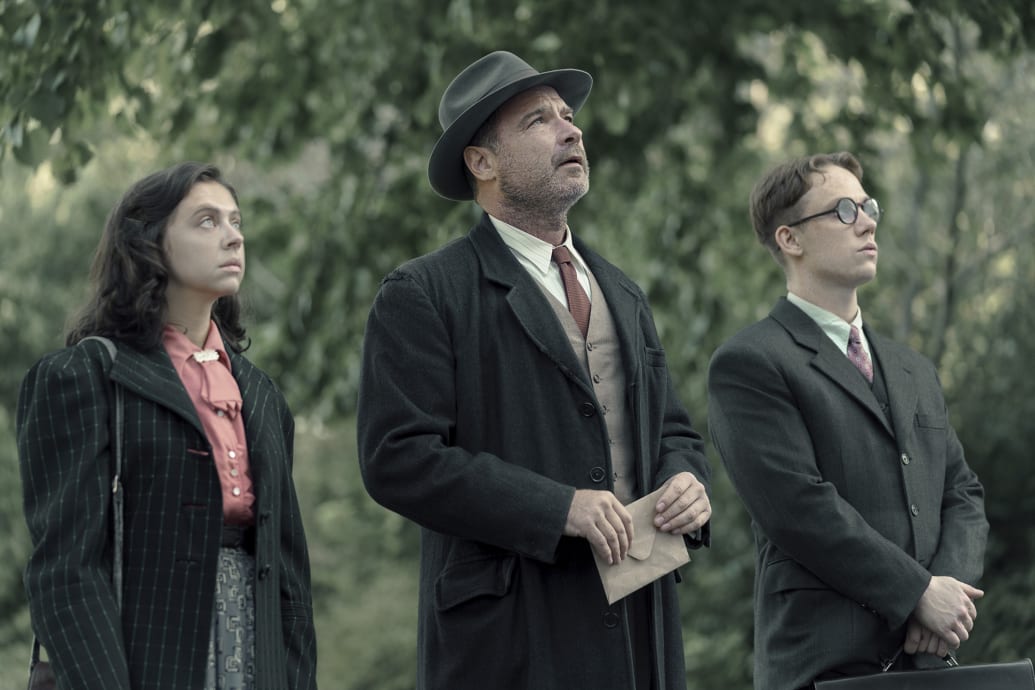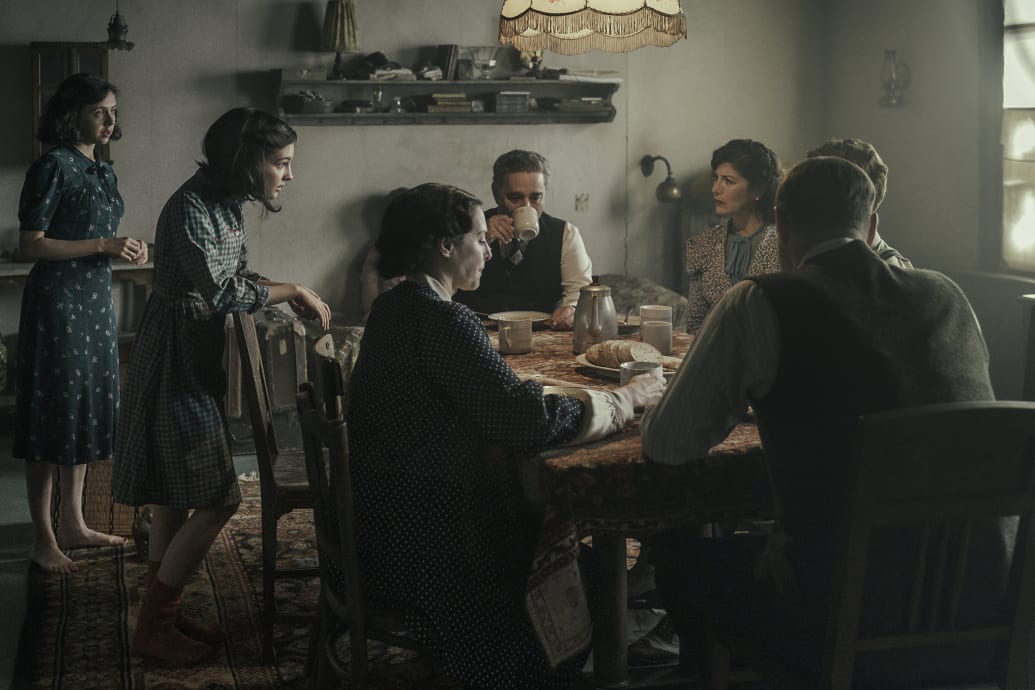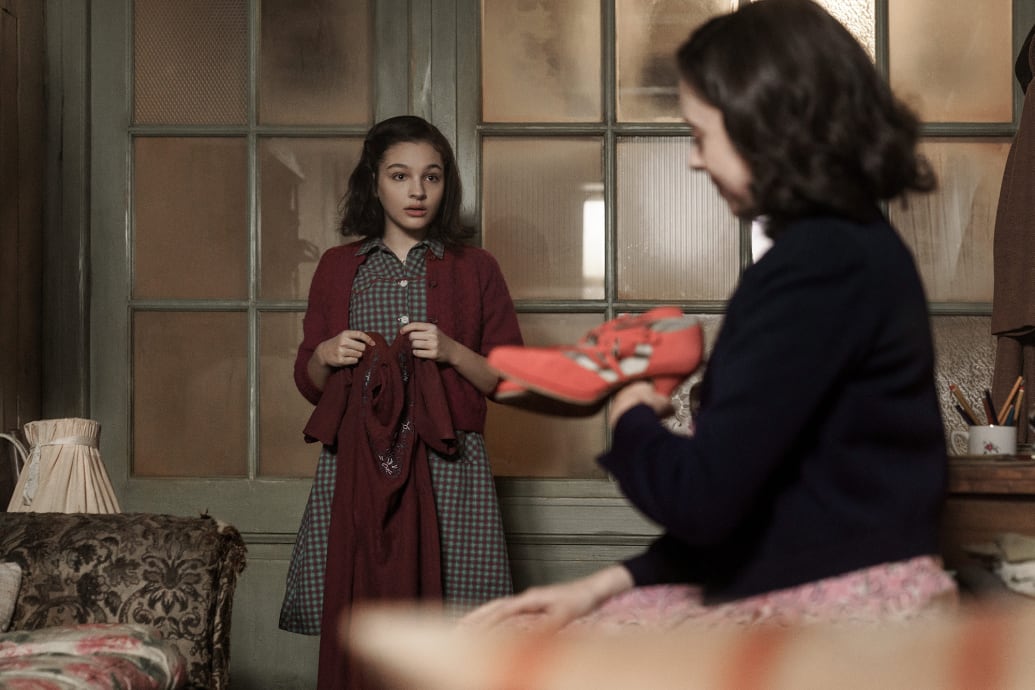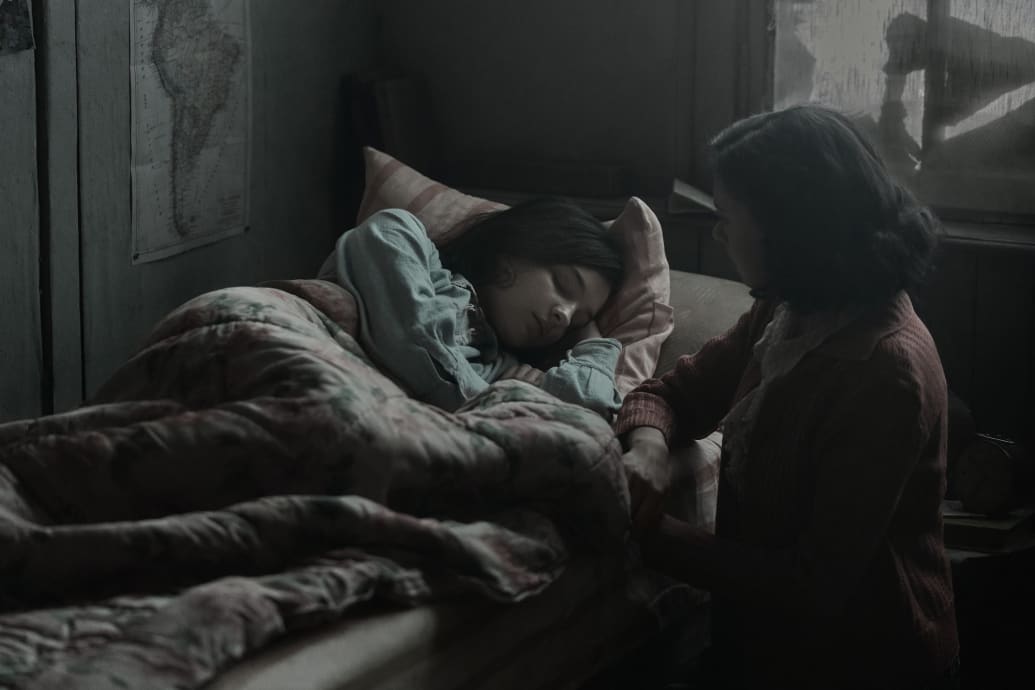my copy Anne Frank: Diary of a Young Girl The torn, fragile pages are held together by a rubber band. This is just a Scholastic paperback purchased in 1969, in its 66th edition. This copy wept, moved across the country, and was re-read many times, most recently after touring the sets built to replicate Anne’s world.
Years ago, on my way back from a mission in Africa, I planned a stay in Amsterdam to visit the Hidden Annex. I waited for hours in the drizzle to climb those 500 square meters of steep, narrow steps where eight people hid from the Nazis. So I’ve been thinking about Anne Frank – her words and her world that is no more – for over half a century.
Although I still recognize the name Miep Gies, I didn’t know what kind of hero she was until I heard her name. A Little Light.
Most people, including Bel Powley (Morning Show), who portrayed Miep in the mini-series.
“Honestly, I didn’t know anything about him,” says Powley after a long day of shooting on a dreary day in Prague. “Of course I knew the Anne Frank story.”
Two more episodes, which aired on National Geographic on May 1 and aired on Hulu and Disney+ the next day, were six months away. And by now, she and Joe Cole, who plays her onscreen husband Jan Gies, have bonded. They sit side by side at a small table and admit that no matter how much they have learned about these extraordinary heroes, they still admire them and their courage.
Miep brought smuggled food to Anne and seven others who hid with her for 25 months. Miep defied the Nazis and risked death.
It’s hardly a spoiler to say that the Nazis led everyone in the attic towards the end of the war. Later, Miep sneaked back upstairs, collected Anne’s diaries and put them in a drawer for safekeeping. After the war, he planned to return them to the girl.
Anne Frank died of typhus in the Bergen-Belsen concentration camp. She was 15 years old.
Eventually, Miep presented the diaries to the sole surviving member of the Secret Annex, Anne’s father, Otto Frank, who had published them. They have been translated into 70 languages and have sold nearly 30 million copies.
Anne Frank’s writings would be lost if Miep Gies weren’t there every day.
A Little Light The story of this extraordinary woman who claims to be everything. The title refers to Miep’s famous quote: “I don’t like being called a hero because no one should think you have to be special to help others. Even an ordinary secretary, a housewife, or a teenager can turn on a little light in a dark room.”

Miep Gies, played by Bel Powley, Otto Frank, played by Liev Schreiber, and Jan Gies, played by Joe Cole, look at Otto’s old apartment. A Little Light.
National Geographic for Disney/Dusan Martincek
an ordinary person
By the way, Miep wasn’t Jewish but the actress who played her, Powley, is.
“I identify as Jewish,” says Powley. “I was raised Jewish. My father is not Jewish. But my mother grew up in a beautiful Orthodox family.”
Powley grew up celebrating Jewish holidays at his grandmother’s house. Like most European Jews, Powley knew his past; it’s never that far away.
“The proposal for this actually came to me on the very special Holocaust Remembrance Day,” he says, not blinking those big blue eyes. “Before I read the pilot, I already knew that this was something I wanted to be a part of, and being a part of this story and being able to play this character because of my heritage feels very special.”
Joan Rater and Tony Phalen were fascinated by Miep’s dedication. They watched a documentary Remembered Anne Frank, about Miep in 1996. They visited the Anne Frank Museum on a family trip to Amsterdam. These eight hours that do not sanctify or sanctify the Mother are the product of six years of research.
They serve as executive producers, co-series executives, co-creators and writers, and Phelan directed the last three episodes. Gies’ unwavering courage still impresses them.
“Miep is an ordinary person who history has mythologized like Anne Frank,” Rater says. “I want to tell the story of an ordinary person.”
Despite his heroism, Miep was absolutely ordinary. After the First World War, he was starving in Vienna as a child when his mother sent him to the Netherlands to be rehabilitated. When Miep graduated from high school, she was a bit of a clumsy to the liking of her stepfamily. They said he should marry his gay and adopted brother. Instead, the two decided to get a job.
That’s how Miep got to know the Franks. He had no experience, but Otto took pity on him and hired him at his company, Opekta, at Prinsengracht 263. The family hid in the attic that day when their 16-year-old daughter, Margot, received documents to report to a camp.

Miep chats with the Frank and van Pels families in the secret annex.
National Geographic for Disney/Dusan Martincek
Everyone—the four in the Frank family, Otto’s business partner, his wife and son, and a family friend—was safe for over two years. Miep and her husband Jan (Joe Cole, Peaky Blinders), another hero of the Dutch Resistance, did their best. Meanwhile, Anne recorded everyone’s annoying habits and limited life in her diary.
And thanks to this article, Anne became the most famous victim of the Holocaust. We can relate to one girl, not the incredible 6 million people killed for being Jewish. We know Anne from her diary entries such as: “If I write, I can throw everything off; My sorrows disappear, my courage is reborn. But that’s the question, will I be able to write something great, be a journalist or a writer? I hope so, oh, I hope so much, because as I write I can recapture everything, my thoughts, ideals and fantasies.
Doing Extraordinary Things
Of course, it all ends horribly. Still, the series offers signs of lightness. Flashing back to the sunny day of Miep and Jan’s wedding in 1941, Anne jumps in. She reminds him that he was an ordinary break in an extraordinary time—although he was a great writer.
“She was just a somersault girl and then she hid,” Rater says. “And so, mediocrity is something that always stays. Oh, there’s another thing that blew my mind that I connected with as a parent: when Otto in an interview said he didn’t know this girl when he read the diary.”
By now, though, the rest of us know. Phelan and Rater didn’t want to make another movie here about Anne, played by Billie Boullet with just the right amount of young diva and wise old soul. Ashley Brooke plays the quieter, nervous older sister, Margot, who draws on her grandmother’s experience as a Holocaust survivor.
“My grandmother lived to be 96 and passed away about a year and a half ago,” Brooke says. “The USC Shoah Foundation interviewed him, which is actually my insanity. [a student at USC] Now. I watched her interview before this project because she started to forget things as she got older so she couldn’t tell us the full story. But those interviews were very special and I remember highlighting all the hopeful moments that allowed him to survive. He was not pessimistic about anything.”
This all sounds right; the performances, the costumes, the eerily conspicuous sets and the unbearable weight on Otto’s shoulders.
“It was actually quite a small role and I was in Ukraine and they sent me this,” says Liev Schreiber, who plays the patriarch. “And I thought, wow, this is a really contemporary retelling of the Anne Frank story, but with a totally unique perspective of the person who was really responsible for their survival as long as they survived. It was one of the things I thought about when meeting these grassroots NGOs in Ukraine – like ordinary people doing extraordinary things against incredible odds. And while I was doing that job and meeting those people, I felt like the script fell into my lap.”
Schreiber works as a volunteer in Ukraine, the homeland of his Jewish grandfather. He sees people with Miep’s guts and praises Phelan and Rater for making the limited series feel as if it wasn’t buried in amber.

Anne, played by Billie Boullet, receives a gift from Miep, played by Bel Powley. A Little Light.
National Geographic for Disney/Dusan Martincek
Today’s Impact
One of the subtle ways the miniseries feels contemporary as it moves through history is with each episode’s closing credits. Contemporary artists interpret old music courtesy of Este Haim of sister group Haim. As executive music producer, it chose Kamasi Washington, who performed Charlie Parker’s “Cheryl,” and King Princess and Orville Peck, who contributed inter alia to Bing Crosby’s “I’m Making Believe.”
Haim, who is also Jewish and keenly aware of the parallels between WWII and today’s antisemitism, said: “I’d be lying if I said there weren’t times in 2023 when I was really scared. Almost 100 years later and we’re still dealing with this shit.” He’s fascinated by this tiny woman who stood up to the Nazis.As Haim puts it, Miep was “a scourge.”
Miep eventually wrote a memoir where Powley was thinking about his Bible while filming this.
“I read it three times in a row before I started, just to understand his voice because it was written from his point of view, and you can really understand how outspoken, brash, confident and funny he is. Powley says.
Filming took five months, mainly in the Czech Republic, where Amsterdam was replaced by Prague. All concerned say that working on the project left a mark. Independently, they talk about how they hope Miep’s example encourages people to take action even against unspeakable evil.
“This is incredibly scary,” Cole says. “It’s just, like, sometimes I don’t quite understand. When I visit Anne Frank’s house, young Margot, you see a lot of images, you see the pictures on the walls, being in that space.

Billie Boullet’s Anne sleeps while Bel Powley’s Miep watches her. A Little Light.
National Geographic for Disney/Dusan Martincek
Powley sat quietly next to him and nodded. The cast and crew talk about how widespread anti-Semitism is. On the same October, as he was finishing a scene in Prague, anti-Semitic men hung a banner on the 405 flyover in Los Angeles stating that Kanye was right as he gave the Hitler salute.
“I don’t think you feel any less as a non-Jew,” Powley says. “But I think it’s just scary right now.”
The terror that was howling in Jewish communities is then felt again.
The day I write this, I attended an interfaith Holocaust commemoration, where a man talked about his parents who had met in the camps. Like the Franks, they were from Amsterdam.
During the Mass, I ran into a friend of mine, 93-year-old Holocaust survivor Hanna Keselman. Like many German Jews, Hanna’s family knew that Hitler was dangerous long before the rest of the world knew. They fled to France in 1933. It wasn’t far enough. At the age of 8, he was alone for four years. Hanna lost her father in the war and later moved to America.
He still tells his story today because no one should forget what happened and what happened. Two days before mass, anti-Jewish graffiti appeared in Greenwich Village.
Haim is right. This is scary.
“I was amazed at how modern, contemporary and relatable Tony and Joan’s take on this story was,” says Powley. “And that is incredibly important in the current political environment. So antisemitism is on the rise. There are now more displaced people in the world than ever before. So, if we’re going to do this show, people are like, ‘Well, what would I do?’ It was important to me and my family history to make him think.”
Keep being obsessed! Sign up for Daily Beast’s Obsessed newsletter and follow us Facebook, twitter, instagram And TikTok.